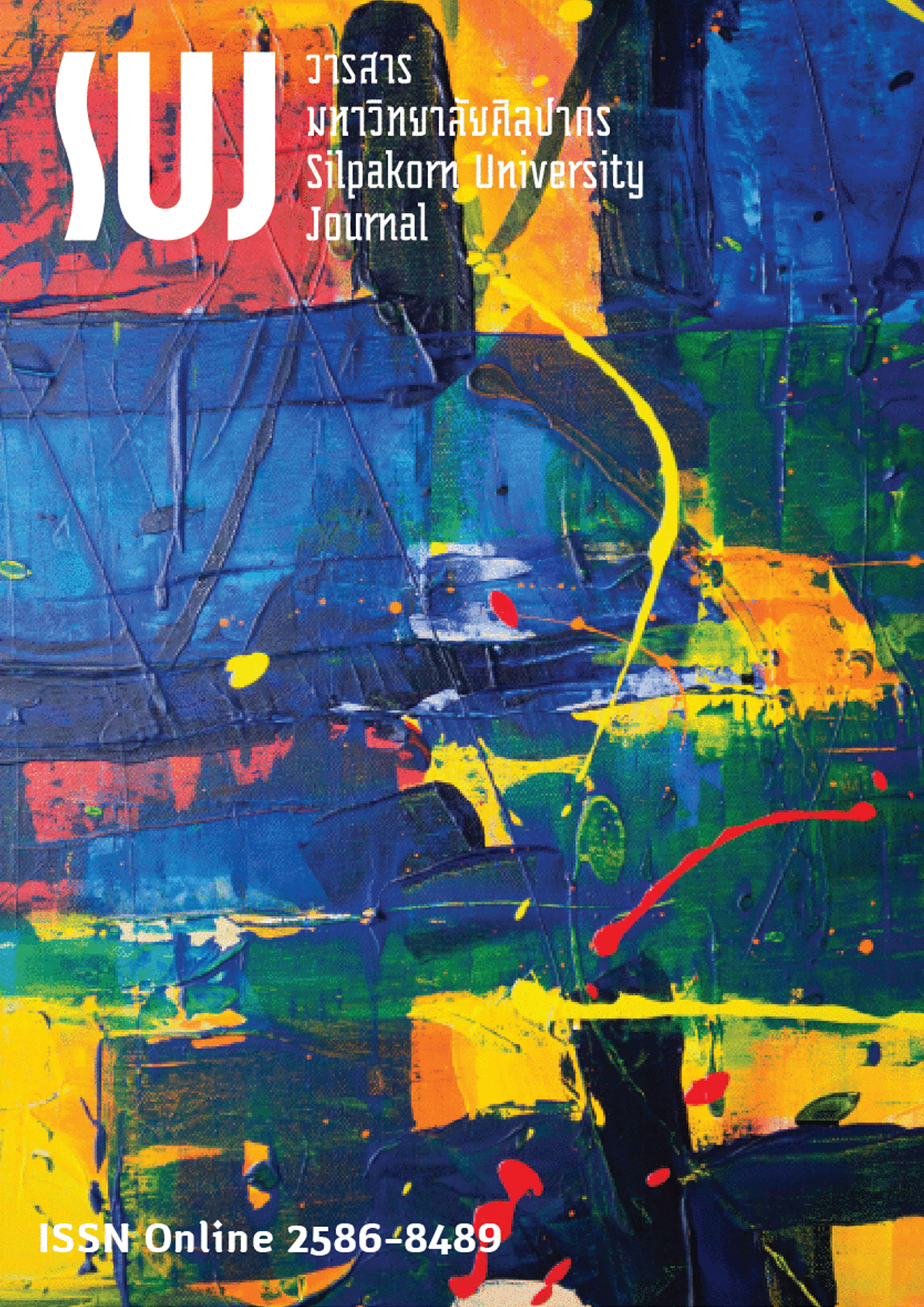ผลของโปรแกรมการฝึกพูดกับตนเองเชิงบวกต่อภาวะความเครียดของนักเรียนชั้นมัธยมศึกษาปีที่ 6 จังหวัดสมุทรสงคราม (Effects of positive self-talk training program against the stress of Mathayomsuksa 6 students in Samutsongkhram Province)
Main Article Content
Abstract
การวิจัยนี้มีวัตถุประสงค์เพื่อ (1) เปรียบเทียบภาวะความเครียดของนักเรียนกลุ่มทดลองและกลุ่มควบคุมหลังการใช้โปรแกรมการฝึกพูดกับตนเองเชิงบวก (2) เปรียบเทียบภาวะความเครียดของนักเรียนกลุ่มทดลองก่อนและหลังการใช้โปรแกรมการฝึกพูดกับตนเองเชิงบวก ด้วยวิธีการวิจัยกึ่งทดลองโดยคัดเลือกตัวอย่างตามระดับภาวะความเครียดเดียวกันจากนักเรียนที่มีคะแนนภาวะความเครียดอยู่ในระดับสูงถึงระดับรุนแรง จำนวน 40 คน กำหนดเป็นกลุ่มทดลองและกลุ่มควบคุม จำนวน 2 กลุ่ม ๆ ละ 20 คน เครื่องมือที่ใช้ได้แก่แบบสอบถามข้อมูลส่วนบุคคล แบบวัดภาวะความเครียดสวนปรุง และโปรแกรมการฝึกพูดกับตนเองเชิงบวก วิเคราะห์ข้อมูลทางสถิติโดยการทดสอบค่าทีและวิเคราะห์เนื้อหาจากใบงานเพื่อสนับสนุนผลการใช้โปรแกรมฯ ผลการวิจัยพบว่า (1) ภาวะความเครียดของนักเรียนกลุ่มทดลองและกลุ่มควบคุม หลังการทดลองมีความแตกต่างกันอย่างมีนัยสำคัญทางสถิติที่ระดับ .05 โดยกลุ่มทดลองมีภาวะความเครียดอยู่ในระดับปานกลาง (X̅ = 37.45) กลุ่มควบคุมมีภาวะความเครียดอยู่ในระดับสูง (X̅ = 55.95) และ (2) ภาวะความเครียดของนักเรียนกลุ่มทดลอง ก่อนและหลังการทดลอง มีความแตกต่างกันอย่างมีนัยสำคัญทางสถิติที่ระดับ .05 โดยก่อนการทดลองมีภาวะความเครียดอยู่ในระดับสูงและหลังการทดลองมีภาวะความเครียดมาอยู่ในระดับปานกลาง (X̅ = 60.10, X̅ = 37.45 ตามลำดับ) จะเห็นได้ว่าหลังการเข้าร่วมโปรแกรมการฝึกพูดกับตนเองเชิงบวก นักเรียนมีภาวะความเครียดน้อยลง ดังนั้นการฝึกพูดกับตนเองเชิงบวกจึงเป็นวิธีที่สามารถช่วยลดภาวะความเครียดได้ โดยทำให้นักเรียนมีความมุ่งมั่นในการเปลี่ยนแปลงทั้งความคิด คำพูดที่มีต่อตนเองและนำไปสู่การปรับเปลี่ยนพฤติกรรมเพื่อประยุกต์ใช้กับปัญหาที่เผชิญในชีวิตประจำวันได้
This research aims (1) to compare the stress of the experimental group of students and the controlled group of students after using the Positive Self-Talk Training Program, (2) compare the stress of the experimental group of students before and after the implementation of Positive Self-Talk Training Program. The researcher applied Quasi-Experimental Design by selecting the sample group of 40 students who had the same stress levels. Then the students were divided into two groups of 20 students, one as an experimental group and as a controlled group. The tools in this research were the personal questionnaire, Suanprung Stress Test-20 and Positive Self-Talk Training Program, data analysis statistics by t-test, and the information analysis from work sheets for supporting Positive Self-Talk Training Program. The results were as follows: (1) the stress level of the experimental group and the controlled group after the experiment were significantly different at .05. The experimental group had the moderate stress (X̅ = 37.45). The controlled group had the high stress ( X̅ = 55.95); (2) the stress of the experimental group both before and after the experiment were statistically different at .05. Before the experiment, the stress was high (X̅ = 60.10), while, after the experiment, the stress level is moderate (X̅ = 37.45). Therefore, it could be seen that after participating in the Positive Self-Talk Training Program, the students had the lower scores of stress level. This made students attempt to change their self-talk which led to changes in their behavior in their daily life.
Downloads
Article Details

This work is licensed under a Creative Commons Attribution-NonCommercial-NoDerivatives 4.0 International License.
References
Braiker, H. B. (1989). The Power of Self-Talk. Psychology Today, 23(12): 23-27.
Burnett, P. C. (1996). Children’s Self-Talk and Significant Others’ Positive and Negative Statements. Journal of Educational Psychology, 16(1): 57-67.
Cheerachareonpong, Sirinya. (2013). Causal Factors Influencing Positive Thinking of Senior High School Students Under the Secondary Educational Service Area 11 (ปัจจัยเชิงสาเหตุที่ส่งผลต่อการคิดเชิงบวกของนักเรียนชั้นมัธยมศึกษาตอนปลายสังกัด สำนักงานเขตพื้นที่การศึกษามัธยมศึกษาเขต 11). Veridian E-Journal, Silpakorn University, 6(3): 537-555.
Daungnoi, Woraphong. (2010). Using Positive Self-Talk Training Program to Reduce Depression of AIDS Affected Teenagers (การใช้โปรแกรมการฝึกพูดกับตนเองทางบวกเพื่อลดภาวะซึมเศร้าในเด็กวัยรุ่นที่ได้รับผลกระทบจากโรคเอดส์). Master’s dissertation, Chiang Mai University, Chiang Mai, Thailand.
Davidhizar, R. E., & Sheare, R. (1996). Increasing Self-Confidence Through Self-Talk. Home Healthcare Nurse, 14(2): 119-122.
Horwitz, A. G., Hill, R. M., & King, C. A. (2011). Specific coping behaviors in relation to adolescent depression and suicidal ideation. Journal of Adolescence, 34: 1077-1085.
Kaewkaewpan, Wananya. (2021). The Study of Stress of Teenage Students Studying in the Mathayomsuksa 6 of School Under Secondary Educational Service Area Office 10 in Samutsongkhram Province (การศึกษาความเครียดของนักเรียนวัยรุ่นชั้นมัธยมศึกษาปีที่ 6 โรงเรียนสังกัดสำนักงานเขตพื้นที่การศึกษามัธยมศึกษาเขต 10 จังหวัดสมุทรสงคราม). Journal of Education Burapha University, 32(2): 13-28.
Kamthorn, Lamjiak, & Akkarasuwankul, Thapanee. (2015). A Positive Self-Talk Program is Efficacious to Reduce Stress among Nursing in Clinical Practice for the first time (ผลของโปรแกรมการพูดกับตัวเองทางบวกต่อภาวะเครียดในนักศึกษาพยาบาล วิทยาลัยพยาบาลบรมราชชนนีตรัง ในการฝึกภาคปฏิบัติในหอผู้ป่วยครั้งแรก). In National Academic Conference of the Year 2015 on Nursing Science On Creating Thinkers for Learners in the 21st Century, (pp. 30-39). Trang: Boromarajonani College of Nursing.
Kottler, J. A., & Chen, D. D. (2011). Stress Management and Prevention: Applications to Everyday Life (2nd ed). New York, NY: Routledge.
Lazarus, R. S., & Folkman, S. (1984). Stress Appraisal and Coping. New York, NY: Springer Publishing Co.
Mahakittikun, Khwanjit. (2005). Effect of Positive Self-Talk Training Program on Depression Among Adolescents (ผลของโปรแกรมการฝึกพูดต่อตัวเองทางบวกต่อภาวะซึมเศร้าในเด็กวัยรุ่น). Master’s dissertation, Chiang Mai University, Chiang Mai, Thailand.
Nelson-Jones, R. (1990). Thinking Skill: Managing and Preventing Personal Problems. Pacific Grove, California: Brooks/Cole Publishing Co.
Nelson-Jones, R. (2004). Effect Thinking Skill (4th ed.). London: SAGE Publishing.
Punsuwun, Sasinun, Mahakittikun, Khwanjit, Uthchachon, Pitphan, & Kanathum, Uncharee. (2017). Effects of Positive Self-talk Training Program on Self-esteem and Psychological Well-being Among Pregnant Adolescents (ผลของโปรแกรมการฝึกพูดกับตัวเองทางบวกต่อความรู้สึกมีคุณค่าในตนเองและความผาสุกทางจิตใจของหญิงตั้งครรภ์วัยรุ่น). Songklanagarind Journal of Nursing, 37(2): 77-89.
Ronan, K. R., & Kendall, P. C. (1997). Self-Talk in Distress Youth: States of Mind and Content Specificity. Journal Clinical Child Psychology, 26(4): 330-337.
Seekan, Kamnoeng. (2008). Effect of the Positive Self-talk Training Program in Patients with Generalized Anxiety Disorder (ผลของโปรแกรมการฝึกพูดกับตัวเองทางบวกต่อความวิตกกังวลในผู้ป่วยโรควิตกกังวล). Journal of Health Systems Research, 2(1): 680-684.
Selye, H. (2013). The Stress of Life. New York, NY: McGraw-Hill.
Taweewattanakit, Yupa. (2019). Survey on Behavior of Thai Adolescents who are the Most Addicted to Drugs (สำรวจพฤติกรรมวัยรุ่นไทยหนักสุดติดยา). [Online]. Retrieved September 19, 2021 from https://www.dmh.go.th/news-dmh/view.asp?id=28478
Uratanamnee, Sujitra, & Lerdsamran, Supawadee. (2017). Stress Anxiety and Depression of High School Teenager in Preparation for University Admission (ความเครียด ความวิตกกังวล และภาวะซึมเศร้าของนักเรียนวัยรุ่นที่เตรียมตัวสอบคัดเลือกเข้ามหาวิทยาลัย). The Journal of Psychiatric Nursing and Mental Health, 31(2): 78-94.
Vuori, Putthachart. (2018). The Development of a Positive Self-talk Training Program to Enhance Emotional Quotient and Self-Esteem of the Faculty of Education Students, Suratthani Rajabhat University (การพัฒนาโปรแกรมฝึกพูดกับตนเองเชิงบวกเพื่อส่งเสริมความฉลาดทางอารมณ์และการเห็นคุณค่าในตนเองของนักศึกษาคณะครุศาสตร์ มหาวิทยาลัยราชภัฏสุราษฎร์ธานี). NRRU Community Research Journal, 15(1): 138-152.
Wanpen, Wimonrat. (2021). Family Relationships, Stress, Depression in Adolescence. The Silent Danger that is not Silent (ความสัมพันธ์ในครอบครัว เครียด ซึมเศร้าในวัยรุ่น ภัยเงียบที่ไม่เงียบ). [Online]. Retrieved September 19, 2021 from https://www.thairath.co.th/lifestyle/life/2017689
Wongrachit, Kiattipoom. (2020). Thai Teenagers Consult Stress Problems (วัยรุ่นไทยปรึกษาปัญหาเครียด). Bangkok: Department of Mental Health, Ministry of Public Health.


